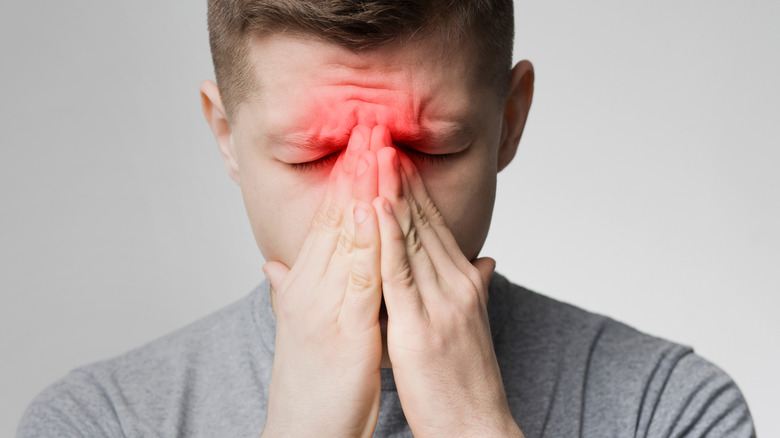Can Kinesiology Tape Ease Sinus Pain And Pressure?
Serena Williams played at this year's Wimbledon with kinesiology tape on her cheek to help with her sinuses (via Insider). Williams told Reuters in 2007 that she suffers from serious sinus pain and pressure, and she's tried everything from taking hot showers and avoiding ice in her drinks to using saline sprays. According to Mayo Clinic, chronic sinusitis occurs when your sinuses stay inflamed for more than three months. Sinus pressure can occur if you have a sinus infection, nasal polyps, or swelling in the sinus lining. It can lead to nasal congestion, fatigue, headache, or aches in the jaw area. Not fun — especially if you're the world's greatest women's tennis champion.
According to Orthopaedic Associates, kinesiology tape is an alternative treatment for muscles and tissues. Putting a small amount of tension on these tissues frees up circulation and reduces inflammation. It might make sense to turn to kinesio tape to reduce the inflammation of the sinuses. You might see YouTube videos on how to use kinesiology tape to alleviate sinus pressure. Spidertech likened kinesio tape to nasal strips that help you breathe better at night.
Relieving sinus inflammation
Orthopaedic Associates says kinesio tape is typically used for injured soft tissues and muscles, and you'll see it on places like the back, calves, knees, and shoulders. Back to Motion mentioned using kinesio tape as physical therapy for sinus pressure, but they suggest applying it to the back of the neck, the forehead, or the bridge of the nose.
According to Forbes, there's no clinical evidence that kinesio tape can ease sinus inflammation. The tape can't get to the area where it's inflamed between the sinus and the nose. However, if people feel kinesio tape eases their sinus pain and pressure, they should use it since it doesn't cause any harm. After all, the placebo effect is real.
Healthline suggests increasing your fluid intake to help clear any sinus blockages due to dehydration. Propping your head with a pillow when you sleep can also keep mucus from blocking up your breathing. Deep breathing, meditation, and other relaxation strategies can help with any pressure and pain from your sinuses.


